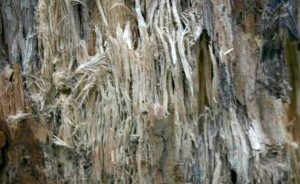
Discoveries by a team of fungal researchers, led by the U.S. Department of Energy Joint Genome Institute (DOE JGI and Clark University Professor of biology David S. Hibbett, were released today (June 23) in the online edition of the Proceedings of the National Academy of Sciences.
The paper, titled “Extensive sampling of basidiomycete genomes demonstrates inadequacy of the white-rot/brown-rot paradigm for wood decay fungi,” suggests that categorizing wood-decaying fungi as either white rot or brown rot may not be as clear-cut as previously thought. The discovery complicates but also broadens the range of fungal decay strategies to be explored for commercializing the process of biofuels production.
Part of Hibbett’s long-running collaboration with the JGI, this research program investigates how fungi break down plant material, with an eye toward developing new resources for biofuel production and other “green” technologies. Traditionally, wood-decay fungi are classified as either “white rot” or “brown rot” depending on the suite of enzymes they possess, and their ability to degrade the recalcitrant plant polymer, lignin, according to Hibbett.
“Through comparative genomic analyses, we discovered several species of wood decay fungi that are neither white nor brown rot fungi, but somewhere in between (‘gray rot’?),” Hibbett said, adding that a general message of this work suggests “that the labels we humans use to describe nature rarely capture the diversity of life.”
Hibbett is one of two lead corresponding authors of the published study, along with DOE JGI Fungal Genomics head Igor Grigoriev. Also contributing to the paper are Ph.D. student Dimitrios Floudas and post-doctoral fellow Laszlo Nagy, who are members of the Hibbett Lab at Clark.
Click here to read the JGI announcement of this publication, “Treading into a Gray Area Along the Spectrum of Wood Decay Fungi.”
Hibbett, who holds the Warren Litsky Endowed Chair in Biology, uses comparative analyses of genes and genomes to infer the evolutionary relationships of fungi, concentrating on the mushroom-forming fungi. He is particularly interested in using phylogenetic approaches to understand the evolution of fungal morphology and ecological strategies. Other interests include biological classification, species recognition, and phyloinformatics. He teaches courses in Introductory Biology, Botanical Diversity, and Biology of Symbiosis.
Here is a video about the DOE JGI Fungal Program
The U.S. Department of Energy Joint Genome Institute, supported by the DOE Office of Science, is committed to advancing genomics in support of DOE missions related to clean energy generation and environmental characterization and cleanup. DOE JGI, headquartered in Walnut Creek, Calif., provides integrated high-throughput sequencing and computational analysis that enable systems-based scientific approaches to these challenges. DOE’s Office of Science is the largest supporter of basic research in the physical sciences in the United States, and is working to address some of the most pressing challenges of our time. For more information, please visit science.energy.gov.
Related Links:
Hibbett Lab news:
https://hibbettlablog.wordpress.com//
Hibbett Lab among research teams working on Open Tree of Life quest
Findings point to fungi as prime suspects in fossil fuel mystery
Clark Voices: Prof. of Biology David Hibbett (Clark University Video)
Founded in 1887 in Worcester, Massachusetts, Clark University is a liberal arts-based research university addressing social and human imperatives on a global scale. Nationally renowned as a college that changes lives, Clark is emerging as a transformative force in higher education today. LEEP (Liberal Education and Effective Practice) is Clark’s pioneering model of education that combines a robust liberal arts curriculum with life-changing world and workplace experiences. Clark’s faculty and students work across boundaries to develop solutions to complex challenges in the natural sciences, psychology, geography, management, urban education, Holocaust and genocide studies, environmental studies, and international development and social change. The Clark educational experience embodies the University’s motto: Challenge convention. Change our world.


